- Home
- Nancy Buckingham
Valley of the Ravens Page 2
Valley of the Ravens Read online
Page 2
“My wife is an invalid,” he said in a tight, brittle voice. “She fell from her horse and received serious injuries to her legs and spine. She will never be able to walk again, let alone ride.”
“Oh, Jerome,” I cried in horror. “I am so dreadfully sorry. I had no idea.”
“How could you have known? Since you left Farracombe, there has been virtually no communication between our two families.”
I said slowly, “Nadine was always so wonderfully vivacious, it is hard to imagine her crippled. How terrible for you both for such a thing to happen.”
“Thank you for your sympathy, Sarah.” Jerome’s voice had become cool and distant, his friendly manner quite gone.
I could not think what to say next. To inquire any further about the extent of Nadine’s injuries would only cause him distress. While I hesitated, Jerome leaned forward and ordered Thomas to stop the carriage.
“There’s a call I want to make on the way home,” he said to me. “I will see you at dinner, Sarah—we have delayed it this evening for your arrival.”
He sprang to the ground without waiting for the carriage to come to a halt. I turned to watch him mount his horse, and a moment later he went past us at a fast canter.
I felt dismayed. I was sure Jerome had intended to ride with me the rest of the way to Farracombe Court. But speaking of his wife’s accident had proved too painful.
I said to Thomas, “How shocking about Mrs. Lefevre. How long ago did it happen?”
He took his time to consider, scratching his side-whiskers with his whip hand.
“It must be three year or more, Miss Sarah. “Twas in the summer, as I remembers. Maister have never bin the same since, poor gennelman. And no wonder.”
Five minutes later we had reached the entrance to Farracombe Court.
A woman emerged from the lodge, wiping floury hands on her white apron. She was someone I did not recognize. Bobbing me a curtsy she hurried to open the tall wrought iron gates, which were each of them inset with the Lefevre coat of arms. The long drive curved through a belt of young beech trees, their leaves already tinted with bronze. Then suddenly the house was in sight.
Farracombe. Beloved home of my childhood. The beautiful old graystone manor had been built in Elizabethan times, but had been much enlarged and altered over the centuries. Still half a mile distant, it stood proudly upon a plateau of the hillside, nine hundred feet above sea level, commanding the entire valley. The last rays of the setting sun caught the gables and tall chimneys, and reflected a blaze of gold from the upper windows.
As we drew nearer I saw a pair of ravens soaring and wheeling above the house, uttering their mournful cry: Kraak-kraak, Kraak-kraak ... Again I shivered. There was a note of sinister foreboding in that harsh, unbeautiful croaking.
We swung into the forecourt between the house and stable block, the carriage wheels clattering on the flagstones. Thomas Tassell drew up adroitly at the flight of steps leading to the front door. At once a footman appeared, bowing formally. I did not recognize him, either.
Foolishly I had expected everything to be just as I remembered it, and I felt a sting of disappointment. But five years had gone by. So much had happened at Farracombe of which I’d known nothing, like Nadine’s tragic accident. It made me feel a stranger, here.
As I alighted from the carriage I had the sensation of being watched. I glanced up and saw the head and shoulders of an old man with flowing white hair and beard who was seated at the window just above the porch. His eyes stared at me, fierce eyes of such an intense gentian blue that they seemed to glitter with an inner light of their own.
I raised my hand in greeting, giving Uncle Joshua a tentative smile. But he made no response. He showed no sign of recognition, while his eyes continued their cold, hard stare.
The footman was waiting. I ascended the steps and passed into the house.
* * *
Chapter 2
As I entered the great hall, I noted that everything seemed reassuringly the same. The collection of John Wootton paintings of horses still hung on the dove-gray walls. The carved-back chairs with their tapestry seats were still there, and the long table supporting two silver candlesticks and a huge bowl of sweet-scented potpourri. The warm feeling of homecoming returned to me.
From a curtained door behind the stairway Mrs. Bardock, the housekeeper, came hurrying forward to greet me.
“Miss Sarah. How are you? Just fancy—seeing you grown up into a young lady.” She broke off, looking at me curiously, and I guessed that she too had noticed my likeness to Felicity.
“How are you, Mrs. Bardock? You look just the same, not a day older.”
This wasn’t strictly true. Her figure was a little plumper, and in her tightly drawn-back hair there were flecks of gray. But I could see that my remark pleased her.
She said, “Mrs. Sellick asked me to give her apologies for not being here to welcome you herself, Miss Sarah, but she has just this minute been called to Mrs. Jerome’s room. She will make a point of seeing you before dinner.”
Mrs. Sellick was Nadine’s widowed aunt, who had brought up Nadine and her brother Oscar after their parents died. Jerome, while holidaying in Europe during his Bar Vacation, had met the three of them in Baden-Baden, where Mrs. Sellick was taking the cure. He fell in love with Nadine and they were married almost at once. When they later came to settle at Farracombe, Mrs. Sellick came with them. Now that Nadine was an invalid, it seemed that her aunt had become virtually the mistress of the house. In the old days, I remembered ruefully, it had been my mother who held that position.
A movement caught my eye. At the head of the wide oak staircase a girl stood watching me. She looked hesitant, half-afraid, poised as though on the point of flight.
“Ginny dear,” I called up to her. “It’s Sarah. Aren’t you coming down to welcome me back?”
She took a couple of tentative steps, then started to run down the stairs with arms and legs and hair ribbons flying, so fast that I feared she might trip and plunge headlong. But she reached the bottom safely and sped across the hall toward me.
“Sarah. I can hardly believe you’re really here at last. I’ve been waiting and waiting for you to arrive.”
I caught her in my arms and hugged her to me. “What a joy to see you again, Ginny darling.”
It was like holding a frail bird, I thought with a sense of shock as I felt her wildly fluttering heartbeat. She was so thin, so pale, her eyes huge smudges of dark shadow. Though Ginny was now thirteen she was still very much a child, a high-strung, over-excitable child.
She tugged at my hand, trying to drag me to the stairs.
“Come on, come on, Sarah. I’ll take you up to your room. Then we can talk. It won’t be the same at dinner, with the others there.”
The housekeeper glanced at me uncertainly. “Miss Sarah will be tired after her long journey. You mustn’t make a nuisance of yourself, Miss Ginny. There will be plenty of time for talking later on.”
My young cousin’s face seemed to crumple, and I realized how easily she could be upset. I said, “It’s quite all right, Mrs. Bardock. Ginny shall show me to my room, and she can stay while I change for dinner.”
The room Ginny led me to was not my old one in the west wing, but a larger room which opened off the main landing. Like Uncle Joshua’s, the window overlooked the forecourt and stable block. I saw that my trunks had already been brought up, and a young maid was lighting a lamp on the dressing table. Another new face. She was an attractive girl, with fair hair and plump cheeks aglow with country health. “Good evening, miss,” she said, giving me a quick bobbing curtsy. “I’m Mary, and Mrs. Bardock says I’m to do for you. I’ve brought up some hot water. Shall I start your unpacking?”
“Thank you, Mary,” I said with a smile. “But there’s no need to do it all now. If you would just get out my toilet things, and the green dress on top of the larger trunk, that’s all I shall need for the present. Perhaps you will come back and finish the rest
of it later.”
While I took off my hat and mantle, Ginny watched me as if still unsure that I was real.
“I was so happy, Sarah, when Jerome told me you were coming back here to live ...” She broke off in sudden confusion. “Oh dear, it must sound dreadful saying that, when it’s because your poor papa has died.”
I put my arms around her and kissed her again. “Don’t worry, Ginny dear, I understand what you mean. And I’m delighted to be back, too.”
The tremulous little smile softened only her lips, not touching her grave blue eyes.
“It’s been so lonely without you, Sarah. Sometimes—sometimes I wished that I could die.”
“You mustn’t say a thing like that,” I exclaimed, shocked.
“But it’s true—it’s true. I often cried when I thought of how it used to be when you and Felicity were here.”
I felt a stab of guilt. We had all been very close, like three sisters. And Ginny, being the little one, had been petted and pampered by Felicity and myself. Yet, when I was taken away from Farracombe, torn from the home I loved, I had thought only of my own unhappiness, never of what it meant for poor little Ginny. Not once in all those five years had it ever struck me that she must have suffered just as deeply as I had.
“I missed you too, Ginny,” I said earnestly. “But we’ll try to make up for it now, shall we? I’m simply longing to go for a gallop on the moors again. My father always insisted that I should continue with my riding, but it was never the same, having to depend on hiring a mount from a hacking stable. Oh Ginny, you’ll see—everything will be just like it used to be. Except, of course, that...”
“That Felicity won’t be here? I wonder, Sarah—do you think she and Ned are happy, wherever they are? Do you think they’re glad they ran away together?”
I shook my head slowly. “I don’t know, Ginny.”
I suddenly wished that my second-cousin was a few years older. I needed someone in whom I could confide the doubts and uncertainties which had tortured me ever since Felicity’s disappearance. Why had she gone? Not for love of Ned Tassell, I felt sure, though it was certain that Ned had been in love with her.
The memory of that dreadful day had remained vivid and painful. For several days previously I’d had a toothache, and finally my mother decided that she must take me to the dentist in Barnstaple. We returned on the afternoon train, and I remember feeling sorry for myself because the dentist had hurt me. Thomas Tassell was waiting for us at the station. As he handed first Mama, then me, into the carriage, I realized that there was something on his mind.
“Mrs. Haddow, ma’am,” he began gravely. “I have to tell ‘ee that Miss Felicity be a-missing.”
“Missing!” exclaimed Mama. “Whatever do you mean, Thomas?”
“Well, ma’am, according to young Albert in the stables, her took Princess out at about ten o’clock ‘smarning, and her bain’t bin seed since. Miss Felicity didn’t come home to luncheon nor nothing.”
Mama’s hands flew to her throat. “Ten o’clock. But that is more than six hours ago. What is being done to find her, Thomas?”
“Mr. Haddow and the Maister are out searching for the young lady, ma’am—and all the menservants, too. But o’course it bain’t easy on the moor today. There be a bit of fog up there.”
“Oh, the foolish girl, to venture out on her own in bad weather.” Mama reached for my hand and clutched it convulsively. “Poor Felicity, she may have been thrown. Perhaps she is now lying injured somewhere, in terrible pain. Or perhaps she has stumbled into one of those dreadful bogs.”
“Oh no, Mama,” I said quickly, though cold shivers were running down my spine. “There isn’t a bog in the whole of Exmoor that is really dangerous.”
“Bain’t ‘ee forgetting Farmer Mole, miss?” put in Thomas darkly. “He and his harse got a-swallowed up and no one ever seed they agin.”
“That’s just a silly legend, Thomas,” I protested. “Mama, I am quite sure that Felicity has come to no harm. You know how well she rides. And she’s used to riding Princess. Most likely she realized that she’d lost her way, and is waiting for the fog to lift. The men will soon find her. Thomas, do hurry and get us back to Farracombe as quickly as possible.”
But when we reached the house, there was still no news of Felicity. And by then the servants were full of another strange happening. It seemed that Ned Tassell had not returned from the bank in South Molton with the miners’ wages.
Nobody, at that stage, linked Ned and Felicity. The two events remained quite separate in all our minds.
A little while later, going upstairs to change from my outdoor clothes, some instinct prompted me to go into my sister’s room next to mine. I didn’t know what I expected to find, and at first glance everything appeared normal, just as it should be. But I lingered, gazing around, unable to rid myself of the feeling that something was amiss. Then it struck me—Felicity’s mother-of-pearl trinket box was not in its usual place on the dressing table. Investigating further, I found that other things of hers were missing, too—the sealskin cape and muff that had been a present from Papa on her eighteenth birthday, some undergarments, and her best blue taffeta.
Shocked and. dismayed, I went downstairs and sought out Mama. I wished that I need not tell her this disturbing news, but I could not conceal it from her.
“Sarah, are you positive?” she cried. “What can it mean?” Then, suddenly, her face went ashen, and she stared at me in horror. “Oh, gracious heaven! She has eloped with Ned Tassell. How could she? How could she do such a wicked thing?”
“But Mama, you can’t really believe that.”
She closed her eyes and said faintly, “Have your father sent for, Sarah. He must be told of this at once.”
The search continued with lanterns throughout the night, but there was no longer any real hope that either of them would be found on the moor. Inquiries were made at the railway station and a great many people were asked if they had seen the runaway couple. But no trace of Felicity, nor of Ned Tassell, was discovered—neither then, nor ever since.
Next afternoon their two horses came trotting into the stable yard ...
* * * *
I had finished washing and was getting into the gown that Mary had laid out for me, when Ginny asked in a small voice, “Did you see the ravens just now as you arrived, Sarah?”
I laughed. “It would be difficult to miss them, they make such a fearful croaking. Do you know, in all the time I was away, I never once saw or heard a raven. In an odd sort of way I missed the ugly old birds.”
Ginny looked down at the crimson carpet, tracing the pattern with her toe. She spoke in an awed whisper.
“I ran to the window when I heard them, Sarah, and I saw the carriage bringing you. I was afraid they were going to land on the stable clock tower. They hovered over it, but at last they flew on again, thank goodness.”
Busy with the hooks of my bodice, I said, “Don’t tell me you think it would have been a bad omen if they had landed there.”
Ginny was silent, and I glanced up at her. She was regarding me slantwise, her expression wary and secretive. I was about to ask her what was wrong when there came a tap on the door.
“Come in,” I called.
It was Nadine’s aunt. She was a small, dumpy woman, with a fluttering manner. Her features were undistinguished, and neither her plain gray poplin dress nor her severe hairstyle did anything to flatter her. She was somewhat shortsighted, and peered around the door before coming in.
“Sarah, my dear, is it convenient?” she began, hesitantly.
“Yes, of course, Mrs. Sellick. I am just changing in readiness for dinner.”
“I must do so myself in a minute, but I wanted to come along and greet you first.” She stepped closer to me and looked earnestly into my face. “Goodness gracious, do you realize how uncannily like your sister you have become?”
“I do now. I have been told so twice already. First by Thomas Tassell, and then by Jerome.”
“Have you seen Jerome?” she asked, surprised.
“Yes, on the road. He was out riding and came to meet the carriage.”
“Well, I am glad you had a proper welcome to Farracombe, Sarah. I do hope that Mrs. Bardock explained why I wasn’t downstairs when you arrived. My niece needs a great deal of attention, poor soul.”
“I understand, Mrs. Sellick. I’m afraid I did not know about her accident until Jerome told me just now. It is difficult to believe. Nadine was always such a vital person. And so very beautiful.”
“What did Jerome have to say about the accident?” she inquired.
“He explained that Nadine had fallen from her horse and received serious injuries to her legs and spine. He told me that she will never walk again.”
Thirza Sellick nodded sadly. “It is a great tragedy. We have all had to make it up to her as best we can. Jerome is very devoted—a more devoted husband it would be impossible to imagine.” She broke off and gave me a sorrowful look. “I was so grieved to hear about your poor father, Sarah. Please accept my sincere condolences.”
“Thank you, Mrs. Sellick.”
“Won’t you please call me Aunt Thirza like the others, my dear? I should so much prefer it. Oh, and by the way, Nadine asked me to tell you that she will be coming down to dinner this evening—she is making the effort on your account. But she would like a word with you first, if you have a few minutes to spare.”
“Certainly. I am very nearly ready.”
“Good.” Thirza drifted to the door. “You remember which is her room, I expect? Then I will leave you now, and see you later downstairs.”
Ginny had been hovering quietly in the background. As the door closed behind Thirza, I said to her, “I shall have to hurry, so perhaps you’ll run along now, Ginny dear.”
She hung back, looking at me uneasily. “Sarah—when you talk to Nadine, you won’t tell her what I said, will you?”
“Said? About what, Ginny?”
“About—” But she couldn’t bring herself to explain what she meant. There was a look almost of panic in her vivid blue eyes.

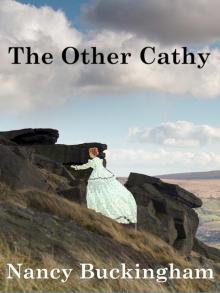 The Other Cathy
The Other Cathy Design for Murder
Design for Murder Valley of the Ravens
Valley of the Ravens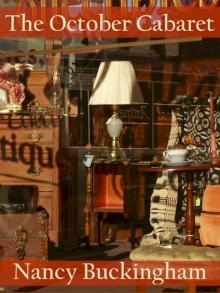 The October Cabaret
The October Cabaret Model Murder
Model Murder Murder in the Cotswolds
Murder in the Cotswolds Deadly Deceit
Deadly Deceit Return to Vienna
Return to Vienna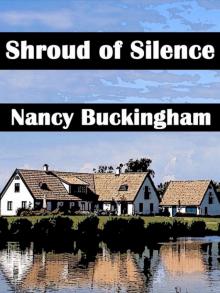 Shroud of Silence
Shroud of Silence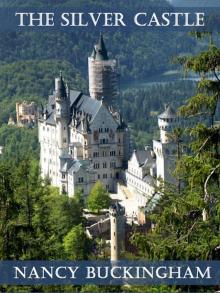 The Silver Castle
The Silver Castle A Cotswolds Legacy
A Cotswolds Legacy Marianna
Marianna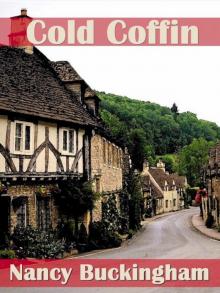 Cold Coffin
Cold Coffin Kiss of Hot Sun
Kiss of Hot Sun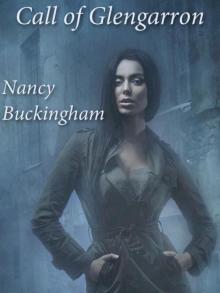 Call of Glengarron
Call of Glengarron Quest for Alexis
Quest for Alexis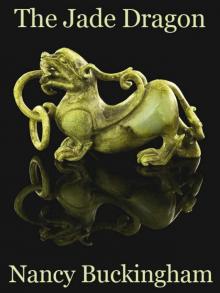 The Jade Dragon
The Jade Dragon